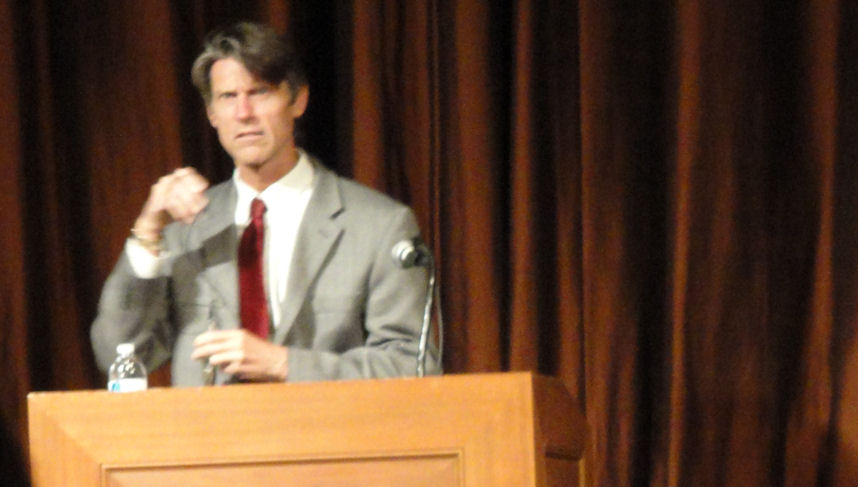
Being back in Washington has the advantage of being able to do intellectual things, such as attending lectures, at low of no cost. Alex & I went to two of them this week. We saw Jonah Goldberg launching his new book called the “the Tyranny of Clichés” at AEI and H.W. Brands talking about his new book, “The Heartbreak of Aaron Burr” at Smithsonian. Both were lively speakers.
Goldberg says that people use clichés as ways to shut off debate and delegitimize arguments they cannot win. He gave the example of somebody saying “violence never solved anything.” This often ends a debate. If you question the statement, it sort of implies that you support or at least accept violence. In fact, violence has solved many problems, especially violent problems. And non-violence works only against people who are already not very violent. Gandhi, for example, could be non-violent only because was facing an opponent – the British – that believed in the rule of law and was susceptible to persuasion. There may have been Gandhi type people in Hitler’s Germany or Stalin’s Soviet Union but they disappeared into concentration camps of Gulags with their voices forever silenced. Usually, potential Gandhis were silence before they even said much of anything at all. Nazis and communists were skilled at identifying and liquidating potential threats even before they were manifest.

I enjoyed the Goldberg speech, but it was more along political lines. The H.W. Brands was more intellectually interesting. He is a historian talking about history and seems to have reached some of the same sorts of conclusions I have about historiography. In fact, when I relate what I recall he said, I am a little worried that it more what I think than a real description.
Brands talked about the differences between writing novels and writing history. Novels are more compelling to some people because you can have dialogue and you can know what people are thinking. Historians almost never can do this. The problem is sources. People tend not to write down all their thoughts and even if they did, the letters or papers tend not to be preserved.
This is the big problem for biographers. Brands said that you can write about extraordinary people because people know that they should keep letters or make notes about what they say. You can sometimes write about ordinary people in extraordinary times because they know to write things down. That is why we can write history of common people during the Civil War because so many people wrote their thoughts. I thought Brands took a courageous stand when he explained why he couldn’t write biographies of women. Women, he said, tended not to have available sources.
You could write a biography of Abigail Adams from her letters to John Adams, but that would mostly be a biography of John too. In fact, that is what David McCullough did with his biography of John Adams. This brings another interesting permutation. The John & Abigail relationship is so rich for historians because they were so often apart when important things were happening. If they are together, they presumably still talk about these things but they leave no record.
Another disadvantage of history versus a novel has to do with conclusions. A novel can produce a story with clear heroes, villains, beginning and endings. History is never so tidy. Beginnings and endings flow into each other and they rarely are clear. History never ends.
I agreed with Brands’ distinction of mysteries from secrets. A secret is something you don’t know but in theory could find out. For example, the plan of attack on Pearl Harbor was a secret, but it could have been known by the U.S. A mystery is cannot be known. A mystery has to do with intentions and aspirations. Many times the person himself doesn’t really know what he wants to do before conditions become clearer. This is the case with the famous treason of Aaron Burr.
Burr went west and was accused of planning to foment a war or maybe an independent movement in the West. Brands says that there is no way to know what Burr really planned. The circumstances never came together to allow him to make his move. Brands also thinks that Burr probably did not have a firm plan in mind. He didn’t know what he was planning to do.
IMO, this is an important thing to remember in history. We all like the good stories, but there are many mysteries in history. They are not known to us now and can never be known. We like to think that all would be well if we could just have been sources, but this is not true. They are not unknown; they are unknowable.
I kept on thinking of the dilemma of history writing. Is there history w/o historians? Obviously, things happen whether or not anybody is there to write them down. But history is more than just a recording of one thing after another. That is why we acknowledge Herodotus as the “father of history.” People recorded events long before Herodotus. Herodotus’ contribution was to try to look at history through a kind of a system, to make explanations, not just record one damn thing after another. This means, however, that historians write their narrative and that their narrative is history. Brands gave the example of constellations. We recognize the big dipper, Aquarius, Scorpio etc. when we look at the night sky. But the stars that make up these constellations are in no way connected. They are thousands of light years apart. But once somebody points out the big dipper, you can never again look at the random jumble of stars w/o seeing the big dipper. We would hope that a historical narrative is more than a mere artificial imposition on a random and meaningless distribution, but clearly the intelligence of the writer imposes order. The interpretation is necessary to make it understandable, but it is not a metaphysical truth. Historical interpretations can change and they do.
In the end we didn’t talk very much about Aaron Burr. Brands joked that we could get that story out of his book. He did explain that he tried to write the book to be interesting like a novel. He was able to do this because there was a good body of letters between Burr and his daughter Theodosia. For details, we need to buy the book.
My top picture shows Brands. He looks very severe in this picture and all the pictures I have seen on his books, but he is very engaging and friendly. The picture don’t do him justice. Below is the Hirshhorn Museum. They had some kind of projection on the building. It was well done. It must be hard to project on a curved surface like that.
